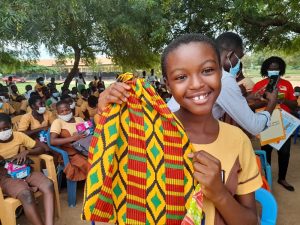The Rotary club of Tema Community 25 recently embarked on a sustinable Menstrual Health and Hygiene (MHH) project. This project was to enable the club provide education to young girls from six(6) selected schools within the Kpone Katamanso enclave within the Greater Accra region. The beneficial schools included Ebenezer Hills “1” and “2” basic schools, Gbetsile KKMA No. 1 and 2 Primary as well as Sebrepor Presby A and B basic schools.
This project, organised by the Service project committee of the club saw members distribute 840 boxes of disposable mentrual pads. Some 90 selected girls in addition were introduced to the use of the sustianble rewashable pads. As part of the education provided to the schools on what constitute proper hygiene and menstral health, the girls were exposed to the right use of the sustianble reusable pads in a live demonstration session.
There was an opportunity for experience sharing where 10 selected girls from the beneficial schools shared their experiences, perceptions, myths and knowledge on menstruation. The Adolescent health nurse of the disctrict who was also present together with the Director of Service Projects provided hands-on relevant eductaion to the girls on the subject matter.
Menstrual hygiene management (MHM) or menstrual health and hygiene (MHH) refers to access to menstrual hygiene products to absorb or collect the flow of blood during menstruation, privacy to change the materials, and access to facilities to dispose of used menstrual management materials. It can also include the “broader systemic factors that link menstruation with health, well-being, gender equality, education, equity, empowerment, and rights”.
Menstrual hygiene management can be particularly challenging for girls and women in countries, where clean water and toilet facilities are often inadequate. Menstrual waste is largely ignored in schools, despite it being a significant problem. Menstruation can be a barrier to education for many girls, as a lack of effective sanitary products restricts girls’ involvement in educational and social activities.
Menstruation is a natural fact of life and a monthly occurrence for the 1.8 billion girls, women, transgender men and non-binary persons of reproductive age. Yet millions of menstruators across the world are denied the right to manage their monthly menstrual cycle in a dignified, healthy way.

Gender inequality, discriminatory social norms, cultural taboos, poverty and lack of basic services often cause girls’ and women’s menstrual health and hygiene needs to go unmet. Adolescent girls may face stigma, harassment and social exclusion during menstruation. Transgender men and non-binary persons who menstruate often face discrimination due to their gender identity that prevents them from accessing the materials and facilities that they need.
All of this has far-reaching negative impacts on the lives of those who menstruate: restricting their mobility, freedom and choices; affecting attendance and participation in school and community life; compromising their safety; and causing stress and anxiety. The challenges are particularly acute for girls and women in humanitarian crises.

The onset of menstruation coincides with new opportunities – and vulnerabilities – that arise during adolescence. Menstrual health and hygiene interventions can be an entry point for other gender-transformative programmes during this period, like sexual and reproductive health education and life skills development.
By strengthening self-efficacy and negotiating ability, MHH programmes can help girls build the skills to overcome obstacles to their health, freedom and development, such as gender-based violence, child marriage and school dropout. Investments in adolescent girls’ well-being yield triple dividends: for those girls, for the women they will become, and for the next generation.










